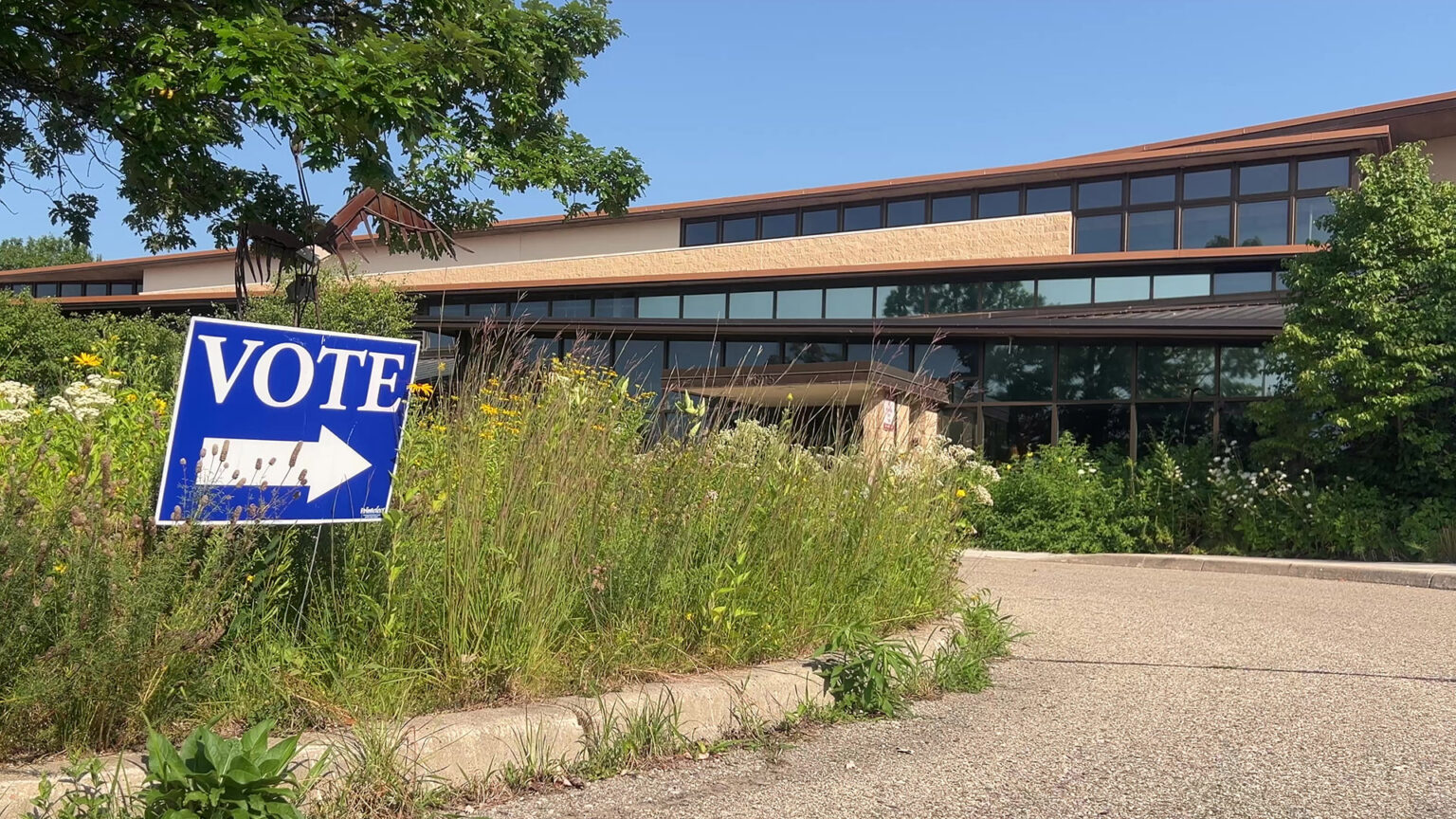Wisconsin Supreme Court weighs attempt to make ineligible voter names public
The Wisconsin Supreme Court is hearing a case brought by a conservative activist who is seeking guardianship records in an effort to find ineligible voters, the latest attempt by those questioning the outcome of the 2020 election to cast doubt on the integrity of elections in the swing state.
Associated Press
September 10, 2024

A sign marks the location of an polling place at Warner Park Community Recreation Center in Madison on Aug. 13, 2024. (Credit: PBS Wisconsin)

MADISON, Wis. (AP) — Liberal justices who control the Wisconsin Supreme Court voiced concerns on Sept. 10 about the motives of a conservative activist who is seeking guardianship records in an effort to find ineligible voters while also appearing to cast doubt that the documents should be made public.
The lawsuit tests the line between protecting personal privacy rights and ensuring that ineligible people can’t vote. It is the latest attempt by those who question the outcome of the 2020 presidential race to cast doubt on the integrity of elections in the presidential swing state.
“What it sounds to me like what you are trying to do is to introduce the fear that there is some sort of illegitimacy going on in the election in the state of Wisconsin, and that concerns me deeply,” said liberal Justice Jill Karofsky during oral arguments on Sept. 10.
Former travel agent Ron Heuer and a group he leads, the Wisconsin Voters Alliance, allege that the number of ineligible voters doesn’t match the count on Wisconsin’s voter registration list. They want the state Supreme Court to rule that counties must release records filed when a judge determines that someone isn’t competent to vote so that those names can be compared to the voter registration list.
“What we want is eligible people to vote and people who are adjudicated by a circuit court judge ineligible to vote not to vote,” said Erick Kaardal, attorney for Heuer and the WVA.
There are ways for the government, not a private watchdog group, to review the records confidentially and determine if someone is voting illegally, said attorney Sam Hall, who represented Walworth County in the case.
Heuer and the WVA filed lawsuits in 13 counties in 2022 seeking guardianship records.
A state appeals court in 2023 overturned a circuit court ruling dismissing the case and found that the records are public. It ordered Walworth County to release them with birthdates and case numbers redacted. The county appealed to the state Supreme Court, which heard arguments on Sept. 10.
Its ruling is unlikely to come before the November election.
Hall said the appeals court ruling “blasts open the door for the personal information of some of the most vulnerable people in our communities to be broadcast, not only to those with noble and good intentions but to those who might do these folks harm.”
He urged the court to issue a ruling directly addressing the merits of the case, not a technical legal issue.
“I don’t think this issue is going away,” Hall said.
He also argued that the law is clear about who has access to the guardianship records, and the WVA did not demonstrate a need.
Kaardal argued that the records should be made public to root out people who are still on the voter rolls after being found ineligible to vote.
But the liberal justices questioned whether the law allows for the records to be made public. Conservative Justice Rebecca Bradley asked if there was a way to perform an audit and ensure that government officials are removing people from the voting rolls when a court has determined they lost that right.
Liberal Justice Rebecca Dallet stressed that there was no proof in the court record that a person ruled incompetent had voted illegally or been sent a ballot illegally or that the state elections commission had done anything wrong.
Heuer and the WVA have pushed conspiracy theories about the 2020 election in an attempt to overturn President Joe Biden’s win in Wisconsin. Heuer was hired as an investigator in the discredited 2020 election probe led by former Wisconsin Supreme Court Justice Michael Gableman that found no evidence of fraud or abuse that would have changed the election results.
The WVA also filed two unsuccessful lawsuits that sought to overturn Biden’s win in Wisconsin.
Biden defeated Donald Trump by nearly 21,000 votes in Wisconsin in 2020, a result that has withstood independent and partisan audits and reviews, as well as lawsuits and the recounts Trump requested.
 Passport
Passport











Follow Us